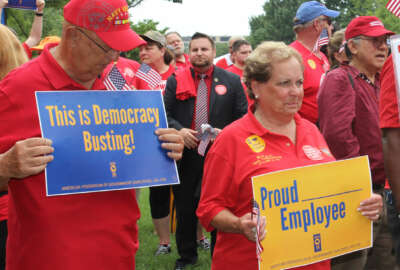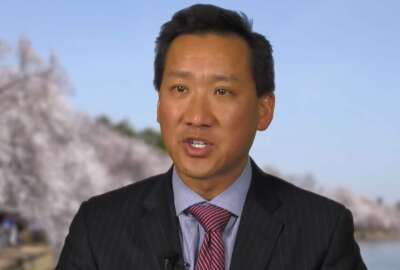
FLRA agrees Education bargained in bad faith, but findings carry little weight
The Federal Labor Relations Authority reportedly told the American Federation of Government Employees this week that the Education Department did bargain in "bad...
Best listening experience is on Chrome, Firefox or Safari. Subscribe to Federal Drive’s daily audio interviews on Apple Podcasts or PodcastOne.
Updated Monday, July 30 at 11:30 a.m. to indicate a new timeline for an anticipated decision in AFGE, AFL-CIO v. Trump.
The Federal Labor Relations Authority weighed in — as much as it can — this week on the ongoing dispute between the Education Department and the American Federation of Government Employees.
FLRA told both the union and the department it found enough evidence to indicate that Education had failed to bargain in “good faith” and violated federal labor law, according to AFGE.
AFGE had filed an unfair labor practice charge with FLRA back in March, after the Education Department announced its plans to end negotiations and implement a new management document. The new document didn’t include a series of previously-agreed-to articles on telework, employee development and training and disability accommodations.
But FLRA’s word doesn’t carry much weight. Under typical circumstances, FLRA would issue a written unfair labor practice complaint after conducting an investigation. But because the agency lacks a general counsel, it can’t issue a formal complaint.
AFGE and Education must either resolve their disputes on their own, or the union must wait until the president appoints a new FLRA general counsel.
“We urge Education officials to return to the table to negotiate a fair and just contract, which all employees deserve,” AFGE General Counsel David Borer said Wednesday in a statement.
In Education’s new management document, the agency limited the amount and the purposes for which union representatives could use official time.
Education’s new policies on official time and collective bargaining are similar to those the president outlined in a series of executive orders, which he signed in late May.
Congress continues questioning of EOs
Those EOs have earned criticism from a variety of members of Congress, including both Democrats and Republicans.
But Maryland Senators Ben Cardin and Chris Van Hollen, however, have a new concern about implementation of the orders, specifically at the Social Security Administration.
SSA told employee unions to vacate agency property by July 31. It also informed collective bargaining unit employees they would have access to a bank of 30,000 total hours of official time, down from the 225,000 hours SSA employees previously used.
According to Cardin and Van Hollen, SSA is implementing the EOs unilaterally, even to employees covered under a collective bargaining agreement that hasn’t expired, the senators said in a letter to the agency’s acting commissioner and associate commissioner for labor-management and employee relations.
“We understand that SSA cannot disregard these executive orders, but we do not understand why SSA is implementing these orders with more hostility toward its workforce than the executive orders require (and possibly even more hostility than they permit),” the senators wrote in a July 25 letter. “Please explain to us what legal or regulatory barriers prevent SSA from honoring its existing collective bargaining agreements while negotiating new agreements in good faith with the unions.”
Cardin and Van Hollen also expressed their concerns in separate letters to the nominees for the SSA commissioner and deputy commissioner.
The president’s executive orders also earned some criticism recently from members of the Senate’s oversight committee.
“It takes time to establish a relationship of trust to then understand the experience they’ve had and be familiar with the facts in a way that you can sufficiently represent them in their grievance,” Sen. Kamala Harris (D-Calif.) said during Thursday’s Senate Homeland Security and Governmental Affairs Committee hearing. “If you’ve hit that 25 percent mark and so [you’re] going to have to go to a bank [of official time] and another person will represent that employee, you can imagine how things will fall through the cracks and that employee will not be appropriately represented.”
Office of Personnel Management Director Jeff Pon defended the executive orders but said he understood concerns from Harris and Sen. Maggie Hassan (D-N.H.). Both senators questioned whether it was more efficient to have one person working solely on representational issues and employee grievances.
“The bank, we think, is sufficient enough to do that,” Pon said. “Usually within these things it’s not just one person representing you. It’s two or three people. In the case of real experience and working at agencies, there’s usually teams of people that are working with the person who’s grieving.”
A federal district judge heard oral arguments Wednesday from government and union attorneys on in the labor organizations’ legal challenge to the president’s executive orders.
Federal unions had initially expected a quick decision from the judge, but oral arguments stretched on for several hours on Wednesday. Citing the difficulty and complexity of the case, the D.C. district judge said she expected she would make a decision by Aug. 24.
Copyright © 2025 Federal News Network. All rights reserved. This website is not intended for users located within the European Economic Area.
Nicole Ogrysko is a reporter for Federal News Network focusing on the federal workforce and federal pay and benefits.
Follow @nogryskoWFED
Related Stories






